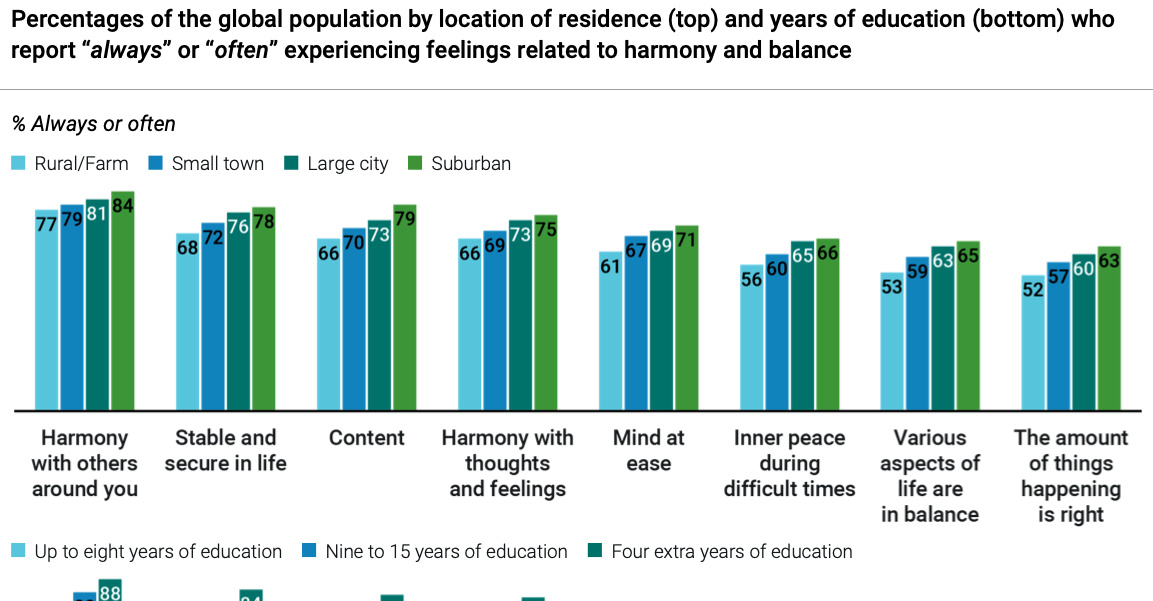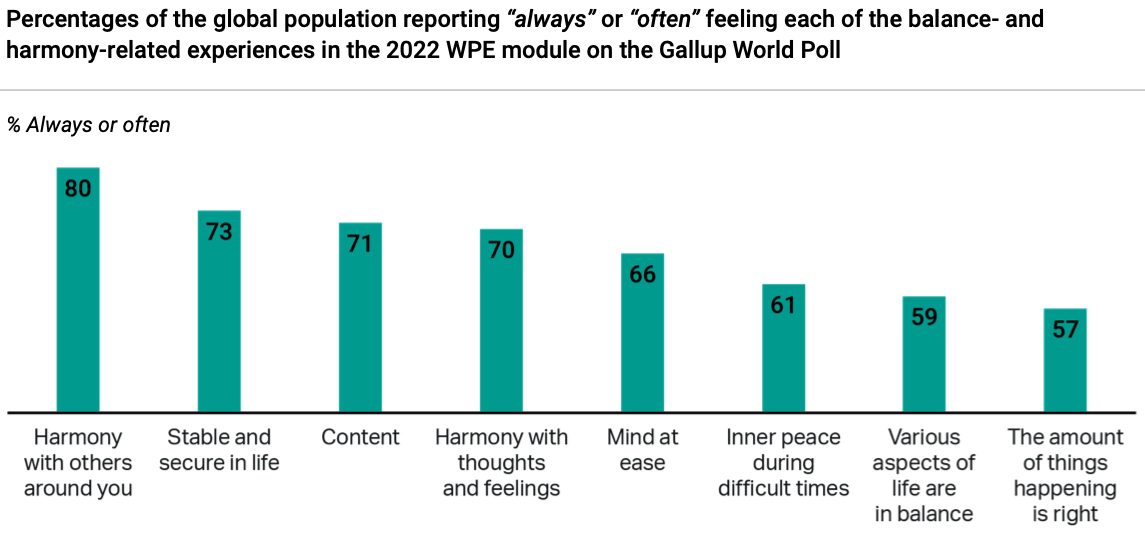A significant majority of the world’s population regularly experiences feelings of contentment, community and other component parts of well-being, according to a new study.
The 2022 global survey of 142 countries by Gallup and the Wellbeing for Planet Earth Foundation found 80% of respondents “always or often” experience harmony with others and no less than 70% experience feelings of stability, security and an integration between thoughts and feelings.
While that may sound like surprisingly good news, there are nuances to the findings.
“The feeling of balance is not as common as harmony,” researchers noted. “Only slight majorities of the global population report experiencing that the various aspects of their lives are in balance (59%) and that the amount of things happening in their lives is just right (57%).”

Judy Skeen (Photo: Sam Simpkins/Belmont University)
Finding balance, as many know, is much easier said than done, said Judy Skeen, a religion professor at Belmont University in Nashville, a spiritual director and a facilitator with the Center for Courage and Renewal.
“I would define well-being as the capacity to feel contentment in one’s life in a steady, ongoing way,” she said. “But it’s hard for me, as a human being, to experience contentment without a healthy sense of purpose and belonging and balance.”
A major obstacle to that balance is an aversion, especially in Western nations, to real or perceived limitations on natural or financial resources, she said. “Limitations are not the problem. The problem is how badly human beings don’t like limitations.”
“Limitations are not the problem. The problem is how badly human beings don’t like limitations.”
The study presents a challenge to consider how judgment can limit the sense of harmony, stability and balance of individuals and even the global population, Skeen noted. “One of the things I would preach or teach from this research is that it challenges the conclusions of either-or thinking and presses us toward a both-and way of thinking toward the environment and all life on the planet.”
Survey respondents were asked a range of questions to measure overall well-being, such as “How often do you feel that the amount of things happening in your life is just right?” and “How often can you find inner peace during difficult times?” For answers, participants were given “always, often, rarely, or never” to choose from.
The study was an effort to provide a “harmonic” view of well-being by measuring concepts such as inner peace and work-life balance, elements typically ignored in studies about happiness, researchers said. “These patterns suggest that the harmonic principles form a new dimension of well-being beyond the established cognitive/evaluative and emotional/affective components of well-being.”

Hence the study did not rely solely on the strength or weakness of a nation’s Gross Domestic Product to estimate the contentment of its citizens. “Well-being is not limited to objective indicators such as GDP or income. Individuals’ subjective experiences and their own sense of how well they live life also matter,” researchers said. “Moreover, activities that negatively affect the quality of individuals’ lives, such as deforestation or burning of fossil fuels, increase country-level GDP while leading to unhappier lives.”
Yet, the survey detected notable differences in individual well-being based on socioeconomic background.
“For example, those with minimal education and those who feel it is very difficult for them to live on their current income experience all of the harmonic well-being principles less often than those with extra years of education and those who feel comfortable living on their current income,” the report explains.
Likewise, people in lower-income regions of the world were found to experience peace, contentment, balance and stability less often than those in more economically developed areas. The survey suggested “that the external environment and services available to people influence these experiences.”
Harmony, however, “is less strikingly influenced by country-level income differences than balance.”
In North America, Australia and New Zealand, 90% of residents reported “always or often” feeling harmony with others, the highest globally. But those percentages dropped when respondents were asked if their minds are at ease (71% in the U.S. and Canada) and if the amount of things happening in life is right (69%).

The study provides even more evidence that a nation’s or person’s financial wealth alone cannot provide the balance needed to find well-being.
“We are losing the ability to pay attention to our lives in the Western world. By economic standards, we are more successful than ever, we have more leisure time than ever, but we are also less happy than ever,” researchers reported.
Anna Lembke’s book, Dopamine Nation: Finding Balance in the Age of Indulgence, captures this dilemma well by describing how addictions to things such as food, gaming, shopping, Facebooking and drugs result from a desperate-but-futile search for harmony and peace, Skeen said.
“It can be our phones, too, or anything that distracts us from what’s really happening in our lives. So many people are searching for ways out of spiritual and emotional poverty in the midst of economic plenty.”
Researchers said violent conflict and location of residence also influenced well-being measures around the world.
“Conflict and war can disrupt people’s sense of internal balance and harmony.”
“When examining country-specific data on balance and harmony, an unsurprising pattern emerges: Conflict and war can disrupt people’s sense of internal balance and harmony,” the report explains. “This point is exemplified by the fact that three countries that consistently rank among the bottom 10 countries in terms of the frequency of reported balance and harmony in 2022 are Afghanistan, Azerbaijan and Sierra Leone.”
In Afghanistan, the repressive Taliban regime is engaged in constant fighting with rebel groups, while Azerbaijani troops frequently clash with an Armenian-majority republic. In Sierra Leone, police and military units use violence against demonstrators.
Whether respondents lived in small towns, large cities or in suburban areas also affected survey results. Suburban dwellers reported the highest levels in each category, including harmony with others (84%), stable life (78%) and inner peace in difficult times (66%). Rural residents reported the lowest levels in each category, including harmony with others (77%), stable life (68%) and inner peace (56%).
Skeen said the work she does as a facilitator with the Center for Courage and Renewal often centers around helping clients find a harmonious balance between all the moving parts of their lives.
“It’s about our inner lives and our outer lives having cohesion,” she explained. “Those with next to nothing are often living in harmony and balance, and they don’t have the need to have more and more and more to find it.”


